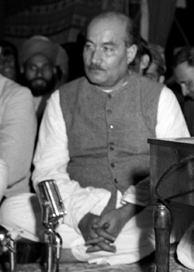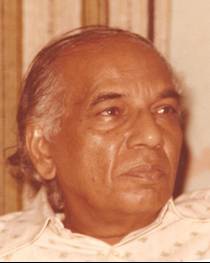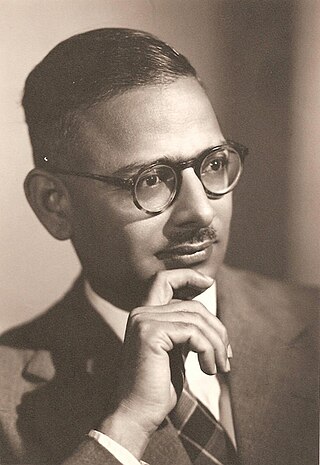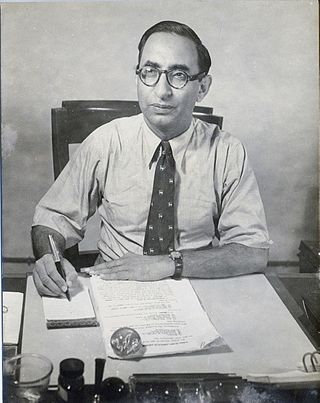
Faiz Ahmad Faiz was a Pakistani poet and author of Punjabi and Urdu literature. Faiz was one of the most celebrated, popular, and influential Urdu writers of his time, and his works and ideas remain widely influential in Pakistan and beyond. Outside of literature, he has been described as "a man of wide experience", having worked as a teacher, military officer, journalist, trade unionist, and broadcaster.

Mir Babar Ali Anees, also known as Mir Anees was an Indian Urdu poet. He used his pen-name (takhallus) of Anees in poetry. Anees used Persian, Urdu, Arabic, and Sanskrit words in his poetry. Anis wrote prolonged Marsias, which was a custom of his times, but nowadays only selected sections are narrated even in religious ceremonies. He died in 1291 Hijra, corresponding with 1874 CE.

Urdu literature comprises the literary works, written in the Urdu language. While, It tends to be dominated by poetry, especially the verse forms of the ghazal and nazm, it has expanded into other styles of writing, including that of the short story, or afsana. Urdu literature is popular mostly in Pakistan, where Urdu is the national language, and in India, where it is an Eighth Schedule language.
The Progressive Writers' Association or the Progressive Writers' Movement of India or Anjuman Tarraqi Pasand Mussanafin-e-Hind or Akhil Bhartiya Pragatishil Lekhak Sangh was a progressive literary movement in pre-partition British India. Some branches of this writers' group existed around the world besides in India, Kashmir and Pakistan

Mir Muhammad Taqi, known as Mir Taqi Mir, was an Urdu poet of the 18th century Mughal India and one of the pioneers who gave shape to the Urdu language itself. He was one of the principal poets of the Delhi School of the Urdu ghazal and is often remembered as one of the best poets of the Urdu language. His pen name (takhallus) was Mir. He spent the latter part of his life in the court of Asaf-ud-Daulah in Lucknow.

Rashid Jahan was an Indian writer and medical doctor known for her Urdu literature and trenchant social commentaries. She wrote short stories and plays and contributed to Angarey (1932), a collection of unconventional short stories written in collaboration with Sajjad Zaheer, Ahmed Ali, and Mahmuduz Zafar.
Syed Sajjad Zaheer was an Indian Urdu writer, Marxist ideologue and radical revolutionary who worked in both India and Pakistan. In the pre-independence era, he was a member of the Communist Party of India and the Progressive Writers' Movement. Upon independence and partition, he moved to the newly created Pakistan and became a founding member of the Communist Party of Pakistan.

Josh Malihabadi popularly known as Shayar-e-Inqalab was a Pakistani Urdu poet, born in Malihabad, British India.
Muhammad Hasan Askari (1919 – 18 January 1978) was a Pakistani scholar, literary critic, writer and linguist of modern Urdu language. Initially "Westernized", he translated western literary, philosophical and metaphysical work into Urdu, notably classics of American, English, French and Russian literature. But in his later years, through personal experiences, geopolitical changes and the influence of authors like René Guénon, and traditional scholars of India towards more latter part of his life, like Maulana Ashraf Ali Thanwi, he became a notable critic of the West and proponent of Islamic culture and ideology.

Hakim Syed Zillur Rahman is an Indian scholar of Unani medicine. He founded Ibn Sina Academy of Medieval Medicine and Sciences in 2000. He had earlier served as Professor and chairman, Department of Ilmul Advia at the Ajmal Khan Tibbiya College, Aligarh Muslim University, Aligarh, for over 40 years before retiring as Dean Faculty of Unani Medicine. After his retirement, he began serving AMU as "Honorary Treasurer". In 2006, the Government of India awarded him the Padma Shri for his contribution to Unani medicine.

Gopi Chand Narang was an Indian theorist, literary critic, and scholar who wrote in Urdu and English. His Urdu literary criticism incorporated a range of modern theoretical frameworks including stylistics, structuralism, post-structuralism, and Eastern poetics.

Syed Ali Jawad Zaidi was an Indian Urdu poet, scholar, and author of over 80 books in several languages. He was also an Indian independence activist, lawyer and later, a civil servant, but is best known for his work in Urdu literature.
Muhammad Ali Siddiqui was a noted scholar of Urdu literature, educationist, literary critic and a newspaper columnist from Pakistan. He was also widely known by his pen name Ariel in Pakistan.
Sir Syed Wazir Hasan was an Indian jurist and Secretary and later President of the All-India Muslim League. A practitioner in the Judicial Commissioner's Court, he was the first Indian Chief Justice of the Awadh Chief Court (1930–1934). His Presidential address at the 24th Session, of Muslim League, held on 11–12 April 1936 in Bombay, was noted for its call of Hindu-Muslim unity, before the call for separate Muslim state was raised by Jinnah the very next year.

Malik Ram Baveja (1906–1993) was a renowned Urdu, Persian and Arabic scholar from India. He received the Sahitya Akademi Award in 1983 for his monumental work Tazkirah-e-Muasireen.

Z. A. Ahmed was an Indian politician from Uttar Pradesh, belonging to the Communist Party of India. In the 1930s, acting on instructions from the CPI, he joined the Congress Socialist Party in which he served as All India Joint Secretary. After a brief period in exile in Pakistan in the 1940s, Ahmed returned to India and became Secretary of the Uttar Pradesh Committee of the CPI. He subsequently served in the Rajya Sabha for four terms, his last term ending in 1994.
Syed Taqi Hassan Abedi is an Indian-Canadian physician who is also poet and scholar of the Urdu language.

Sheikh Muhammad Ikram better known as S. M. Ikram, was a Pakistani historian, biographer, and littérateur. He was member of the Indian Civil Service. In 1947, when Pakistan emerged from British India, Ikram opted for Pakistan and served in the Civil Service of Pakistan. On July 1, 1966, he was appointed as director, Institute of Islamic Culture, Lahore, a position he occupied until his death in 1973, at the age of sixty-four.
Razia Sajjad Zaheer was an Indian writer in the Urdu language, a translator, and a prominent member of the Progressive Writers Association. She won the Uttar Pradesh Sahitya Akademi Award as well as the Soviet Land Nehru Award.
Angarey or Angaaray is a collection of nine short stories and a one act play in Urdu by Sajjad Zaheer, Rashid Jahan, Mahmud-uz-Zafar and Ahmed Ali first published in 1932 and generally considered to have marked the beginning of the Progressive Writers' Movement in Indian literature. The release of the book was marked by protests and it was subsequently banned by the government of the United Provinces a few months after publication.












